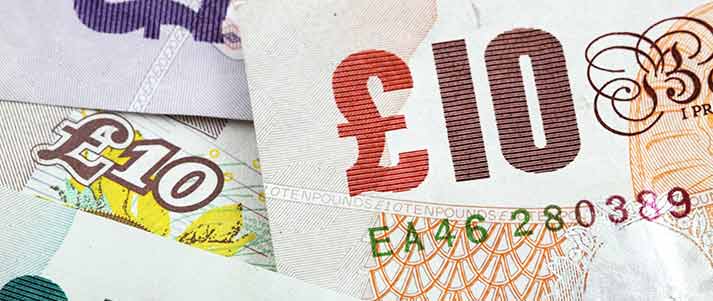How to haggle to get the best bargains
Go to markets around the world and you'll find it hard to resist the excitement of haggling. But if, like most people, you struggle to haggle at home, here's how to negotiate the best deals.

Credit: N.Vector Design (foreground), Marius_Comanescu (background) – Shutterstock
We all love a great online deal and will happily go to the most ridiculous lengths to bag a freebie, but what about haggling? For some reason, it can feel a little uncomfortable to haggle for a better deal on our purchases.
We've learned over the years – both from personal experience and from our readers – that you can save £100s on items like TVs and washing machines on the high street. All you need is some gumption and to haggle with your seller using the techniques we're about to share.
If you're up for learning, we're here to show you how to haggle.
What's in this guide to haggling?
What is haggling?
Put simply, haggling is the process of convincing someone who is selling something to sell it to you for less. You may know it as 'bartering' or even 'negotiating', but it's basically the same thing.
Haggling can save you a fortune. But the first step is to get over the misconception that it's impolite or cheeky.
Some people might suggest it's a little embarrassing to barter down the price of a flatscreen TV. But the law says that until money has changed hands in a shop, no contract on a price has been agreed.
This means that regardless of what's on the price tag, there's no fixed and final price until cash has been exchanged between the seller and the customer. You can choose to offer a different value than what's on the price tag, and the seller can choose whether or not to accept it.
Remember that there's nothing stingy about it either, just ask! It's nothing personal, it's business. The worst that can happen is they'll say "Sorry, that's the best price I can do" and you get the item for the original price anyway.
As far as students are concerned, there's even more reason to try and bargain with sellers as they know you have little disposable income. Even if pulling the 'poor student' card doesn't work, there's no harm in asking.
What can you haggle on?

You can haggle on pretty much anything you want, but you will find it works better in some environments rather than others.
There are no rules that state you categorically cannot haggle on particular items or in particular places. However, you might need to use your judgement to decide whether it's appropriate or not on a case-by-case basis.
We've heard success stories on loads of high-value items such as electronics or jewellery, as well as a wide range of services like phone contracts, internet services and insurance (these being the most flexible and easiest to haggle on).
But don't just think of the big things when haggling. In fact, you can also pick up bargains on smaller items like clothing, your morning coffee or even your taxi ride home.
It can be easiest to haggle at an independent retailer or market. You can get some great deals in these situations as they have the authority to knock down prices themselves. But it's also possible to haggle at high street stores.
There's usually someone in the building who's got the authority to drop the price for you and sort you out with a good deal, even if it's just a small discount. You might even find that high street stores are willing to drop their prices even further than independent retailers. That's because they have a bigger profit margin than smaller businesses.
When is the best time to haggle?
Knowing how to haggle is one thing, but knowing when to haggle is another matter altogether.
The basic rule is that you should haggle on items whenever the demand for them is falling and sellers just want to get rid of the stock.
Always wait until the store is quiet. If there are loads of other customers around who are willing to pay full price, no one is going to waste time bartering with you.
The end of the day is always the best time to haggle, particularly at markets as they're keen to shift any stock they have left before packing up. This could, of course, mean you miss out on items sold earlier in the day. But your chances of getting a great price at a market increase massively if you show up right at the end of the day.
Haggling at the end of a company's financial month or year should be your secret weapon. The end of the day on a Saturday (specifically the last Saturday of each month) is when the people in charge will be trying to meet financial targets. This is when they're more likely to lower prices in order to make a sale.
It's also worth thinking seasonally with your haggling. For example, summer hats and beachwear can be haggled on in winter, and Christmas goods will go for pennies in March, so think ahead to save money on Christmas.
December is also the perfect time to start haggling for non-Christmassy things like buying a car or paying for phone insurance. The festive period is a quiet time for insurers as people are spending their cash elsewhere. But as they still have targets to meet, they're way more likely to let you haggle prices down.
How to haggle and get the best price
These are our top tips on how to haggle and get a discount:
-
Research the price in advance

Credit: dokurose – Shutterstock
The key to successful haggling is confidence. The best way to ensure you'll be convincing is if you come armed with research. In other words, know the market.
Use price comparison websites or apps before you try haggling. This will give you an idea of how low a price you can barter for and allow you to play retailers off against each other (even the high street ones).
You can also use evidence of your items being cheaper elsewhere by showing them the price comparison results and asking them to "price match".
It's fairly common for price match requests to be met in stores as they know they're competing with online sellers for your money.
We've got the best price comparison apps (plus lots more) in our top money-saving apps for students. -
Be friendly with the sales assistant
Avoid being rude or confrontational with the shop assistant. Remember that 'confidence' and 'arrogance' are not the same things (although often, admittedly, the line can be thin).
No one wants to strike a deal or do any favours for someone who comes across as rude or intimidating. The key is to charm your seller so that they find it difficult to say "no".
Research has found that British people are particularly bad at saying "no" as they consider it impolite, meaning the odds are on your side. Use this to your advantage.
Be friendly but firm, cheeky and even a bit flirty if you can handle it. You do want them to like you, after all.
-
Haggle with the right person
There's no point in chatting to a sales assistant if they're in no position to be able to offer you a deal.
Get hunting for someone who looks like they're in a position of authority. Just be careful not to go too senior. A supervisor will have enough authority to lower prices in order to make a sale, whereas a manager has enough to worry about without wasting time listening to you haggle.
Think before you approach them, as this decision could be the cruncher.
-
Don't reveal how much you're willing to pay
You should always have a maximum price in mind. But don't let the seller know what it is, otherwise, there's no way they'll let you have it for any cheaper.
Also, make sure you don't appear too keen. Telling a salesperson you're "absolutely in love" with an item is only going to make them feel confident that they'll make the sale regardless of whether they give you a discount or not. Remember – play it cool, ok? At the point of sale, ask:
I’d like to buy this, but it’s quite a bit more than I'd expected to pay.
Wait for their response rather than forcing the negotiation yourself. Always ask for more of a discount than you'd be happy with, as you're more likely to end up with a compromise somewhere in the middle that's closer to what you were after.
For example, if you're looking to get 10% off, ask for 15%. It's the whole 'meet me in the middle' psychology.
-
Ask for a freebie and buy in bulk

Remember that haggling isn't just about lowering prices, it's also about getting more for your money.
For example, a seller might be hesitant about cutting prices (or may not have the authority to do so), but that doesn't mean they won't be happy to upgrade your purchase by throwing in a little something for free. Make sure you go in with a plan B.
If you're buying a new laptop, ask them to give you something free, like insurance or accessories – anything to upgrade your spending. It doesn't hurt to ask, and sellers will often see this as a compromise.
Buying in bulk is also a great way to make your money go further. You could offer to buy a few of the same product for a discounted price. You can then either sell them online or dish them out to family and friends (at a suitable price so the haggle was worth the hassle, of course!).
-
Become a regular customer
Being a frequent customer can be a great way to increase your chances of a successful haggle. That is, as long as you keep on being charming and don't make a point of haggling every single time you walk through the door (otherwise, you might notice staff running at the sight of you!).
If the staff know you, it'll make it more difficult for them to say "no". Use your friendly charm to make them feel confident that giving you a discount will work in their favour. If they turn you down, they risk losing a loyal customer. They know this.
This also works when it comes to smaller daily expenses like lunch or morning coffees. If you go to the same place every day, ask for a double shot of espresso for free since you're in so often. A few pence here and there really does add up.
-
Use the right language and tone
Use language that'll help you secure a deal. Talk about how you're "thinking of" making a purchase but aren't quite sure.
A good opener is asking the price, followed by "is that with or without a discount?". It implies there will be a discount and the seller's answer will likely be "without a discount". This opens the door to asking what the discount is.
Don't feel like you have to fill the gaps in conversation either. Silence is a very powerful tool (interviewers use it all the time) as the other person can feel obliged to give in to end the awkwardness.
It's also worth thinking about body language. According to research, the best way to play the body language game is to mimic the body language of the seller – if they lean forward confidently, you do the same. But if they back off and seem distant, don't intimidate them by trying to lean in further.
Most importantly – try to keep eye contact. This is the most engaging thing you can do and works wonders at building trust.
-
Look for flaws in the product that could reduce the price
Look for small defects in items that don't really bother you but will lower the RRP. Display or ex-display items are best for this as they tend to have at least a little wear and tear.
This is likely to make it pretty easy for a seller to offer you a discount. Technically, it shouldn't be sold at the same price as if it were brand new.
'Flaws' could be anything from a small dent or scratch on an electrical item or a slight stain on clothing. You'll still be able to get a refund if something else goes wrong because you haven't made the purchase with that exact flaw in mind. Make sure you know your consumer rights.
If you're concerned about this, ask a staff member to write on your receipt exactly what the discount was for and have them sign it as proof.
-
Walk away or pretend you need to check with someone
A nifty trick to help you save a little extra is to say it's a joint purchase, and that you have to call your flatmate or your other half to check how much you're "allowed" to spend.
Go for a walk around the block and, when you get back, tell them you've got permission to spend slightly less than what they're offering.
Don't be fooled into settling on a higher price, either. The salesperson might come back saying that they can "only drop it so far". They'll try and get you to settle at a price defined by their "manager" (sometimes this is the case, but not always!).
Even if their manager has said they can't give it to you for any less than £x, ask them to go back and try again.
And if that still doesn't work, don't be afraid to walk away. Chances are you'll be able to find your treasure at the right price elsewhere.
-
Look for discounted and clearance items

Credit: akamakis – Shutterstock
The easiest items to haggle on are those that are already discounted.
In addition to items that are in sales sections or have discount stickers on them, the final digit on a price tag reveals a whole lot more about a product's status.
If a price tag ends in 1, 7 or 8 (so £9.81, £180.08, etc.) it's either a discontinued or serious clearance item that they're likely desperate to get rid of.
Focus your efforts on any items with these sorts of prices and get your haggle on. There's way more flexibility when offering discounts on clearance items so these price tags are gold.
-
Ask for a warranty
When it comes to electrical items, a great way to grab a discount is to pretend you want a warranty with them.
Salespeople often have targets to meet concerning how many warranties they sell, so they're likely to offer you a better price if you plan to pay to take a warranty with it.
The best part is that you're allowed to cancel your warranty up to 45 days after your purchase. You're not committed to sticking with the warranty after you've got your discount. Cheeky!
-
Haggle with customer services via online chats
This is a particularly good tip for anyone who finds haggling awkward.
When shopping online, have a look for a live chat window and strike up a conversation with your online customer service rep. If this isn't available, ping customer service an email.
Use phrases like "I want to buy this but my budget can't stretch to £x. Do you know when it will be in the sale?" or "I used a 20% off code but it didn't work".
More often than not, you'll find that whoever is on the other end of the chat will be happy to offer you a new code or discount. They know how close you are to making that purchase, so a small online discount is nothing to them if it means securing that sale and keeping you happy.
-
Go to the shop with cash in hand
We know this point doesn't fit so well in a world where all payments are going digital. But if you're serious about haggling, we recommend turning up with cash.
There's something in the psychology of a seller seeing hard cash in front of them that makes it more likely they'll buckle. It's instant cash in the till and they'll be able to save on credit card fees.
These loyalty cards will get you the best reductions on your food shopping, eating out, beauty products and more.








